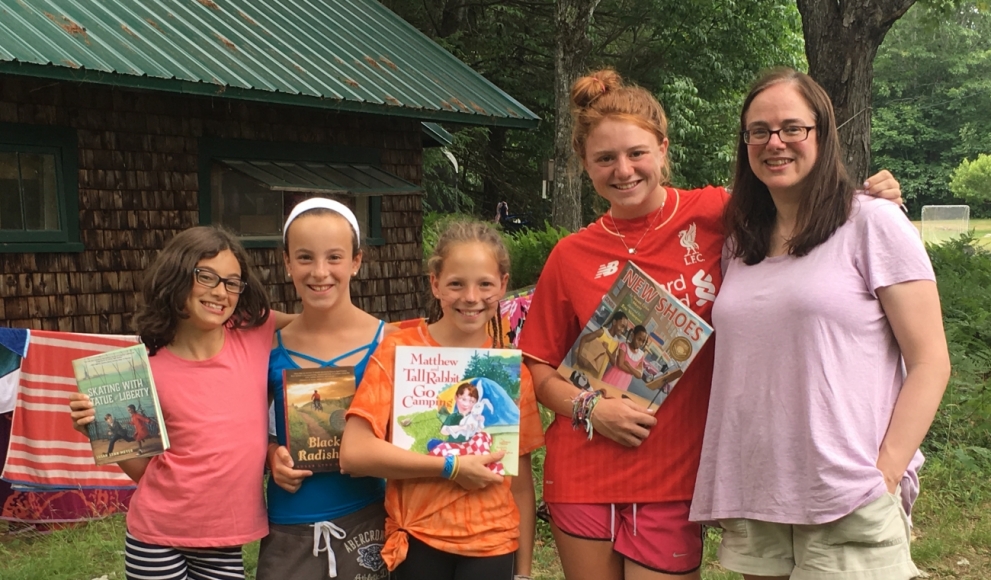Professor Susan Lynn Meyer Talks Books with Avid Young Readers

For Susan Lynn Meyer, professor of English, a highlight of this summer was spending a day with campers at Camp Runoia, an overnight camp for girls in Belgrade Lakes, Maine. Meyer, who has written four children’s books, was there representing Bunk Reads, a books discovery program that makes acclaimed picture books, novels, and nonfiction books available to kids at 11 camps in the state.
The program, which launched this year, aims to prevent “the ‘summer slide’ that teachers talk about—reading ability going backward because kids read less over the summer,” said Meyer, who met for lunch with eight Runoia campers aged 8 to 12 who are voracious readers all year long. “We conversed about being a writer, about what Wellesley is like, and a lot about our favorite books,” she said.
One camper, for example, had read Colm Tóibín’s 2009 novel Brooklyn (about a young Irish woman who emigrates to New York in the fall of 1951) and was eager to discuss the differences between the text and the 2015 movie version. Another had read Laura Hillenbrand’s Unbroken, from 2010, the true story of an American Olympian who was a prisoner of war during World War II. (That story made it to the big screen in 2014.)
“We talked about history and its impact on individual lives,” said Meyer, whose first novel, Black Radishes, was inspired by her father’s experiences as a Jewish boy in Nazi-occupied France. “We also talked about issues of plot consistency in the four-book series by Lois Lowry that begins with The Giver, and about the terrific World War II-era books by the Swedish writer Annika Thor. Those books are not well-known in this country—but I know them, and so did some of these smart, energetic girls.”
Some of the girls also knew about Meyer’s picture book, New Shoes—which deals with segregation in the 1950s—as they had read and discussed it in school last year.
After lunch, Meyer gave an informal talk to roughly 60 girls at the camp about race relations and anti-Semitism in New York in the 1940s. Then she read a chapter from her newest novel, Skating with the Statue of Liberty, which takes place during that time. “I was pleased when they groaned in dismay when the chapter was over,” said Meyer. After the reading, she answered several questions, including: How many drafts do you write? What does an editor do? How does a writer find a literary agent?
Meyer emphasized the importance of revision and showed the girls a long letter she received from the editor of her first novel, asking for multiple changes. She also told them that New Shoes was revised 23 times before publication. “I wanted them to understand that the best writing looks simple, but that a lot of labor goes into it, and that writing is a process of discovery,” said Meyer.
As her time with the campers drew to a close, Meyer said, she thought about why reading is important to young people. “Children get so deeply into the world of the books they read, and books make such a profound impact on them. That makes writing for them a real privilege and responsibility—a responsibility to write books that are about important subjects and of the highest literary quality,” she said.
